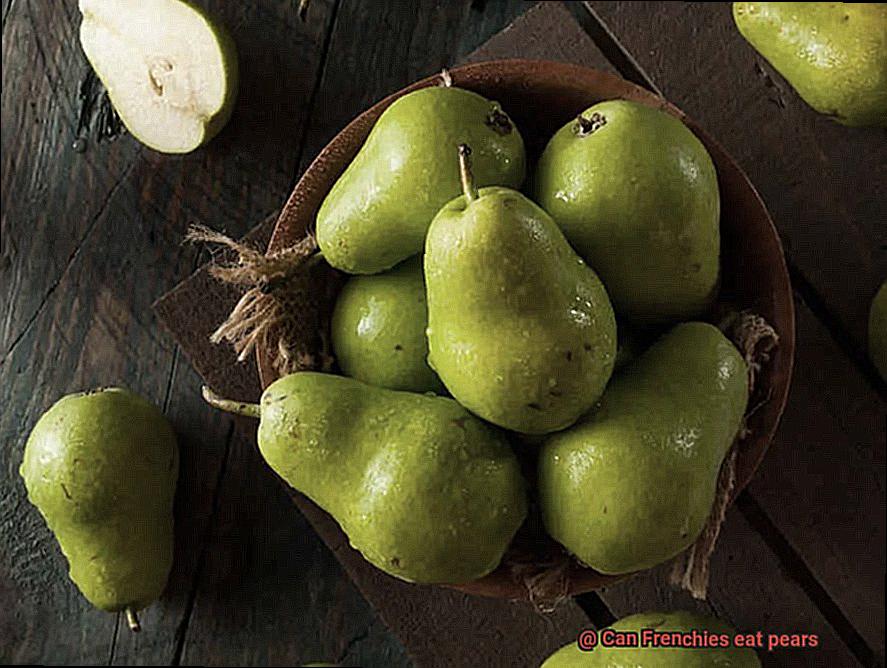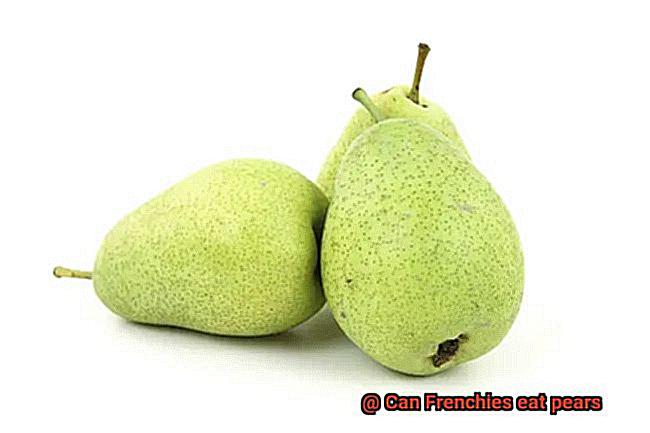Can Frenchies eat pears?
Welcome to our blog, where we dive deep into the wonderful world of French Bulldogs and their taste buds. Today, we’re tackling the burning question on every Frenchie owner’s mind: “Can Frenchies eat pears?” It’s a legit concern because, let’s face it, we all want our four-legged pals to be as healthy and well-fed as possible.
French Bulldogs are known for their playful antics and lovable personalities. But when it comes to their diet, they need a balanced meal plan to truly thrive. While high-quality dog food takes care of their main nutritional needs, some curious owners wonder if fruits like pears can add a little extra oomph to their furry friend’s menu. After all, pears are not only scrumptious but also packed with vitamins, minerals, and fiber that us humans adore. But can Frenchies join the pear party too?
In this blog post, we’ll dig into the nitty-gritty of pear nutrition, uncover any potential health perks for your Frenchie, and dish out any necessary precautions before you toss this fruity delight into their bowl. So buckle up and get ready to find out if Frenchies can safely gobble down pears without any tummy troubles.

Can Frenchies Eat Pears?
Contents
- 1 Can Frenchies Eat Pears?
- 2 Benefits of Eating Pears for French Bulldogs
- 3 Precautions to Consider Before Feeding Pears to a Frenchie
- 4 Nutritional Value of Pears for Dogs
- 5 How Much Pear Can a Frenchie Eat?
- 6 Common Allergens Found in Pears for Dogs
- 7 Signs of an Allergic Reaction in French Bulldogs After Eating Pears
- 8 Tips for Introducing New Foods into a Frenchie’s Diet
- 9 Conclusion
French Bulldogs are known for their adorable squished faces and playful personalities. As pet owners, we want to make sure we provide them with the best care possible, including a well-balanced diet. But what about pears? Can our Frenchies indulge in this juicy fruit? Let’s dive into the pro and cons of feeding pears to our furry friends.
Pros of Feeding Pears to French Bulldogs:
- Nutritional Powerhouses: Pears are packed with essential nutrients like vitamins A, C, and K, which contribute to a strong immune system. These vitamins also aid in maintaining healthy skin and eyes for your Frenchie.
- Fiber for Digestion: French Bulldogs, like many other dog breeds, can sometimes experience digestive issues. The high fiber content in pears can help regulate their digestion and promote healthy bowel movements.
- Low in Calories: If you’re watching your Frenchie’s weight, pears can be a great addition to their diet. They are low in calories and a healthier alternative to processed treats.
Cons of Feeding Pears to French Bulldogs:
- Moderation is Key: While pears are safe for Frenchies to consume, it’s important to remember that they contain natural sugars. Feeding too many pears can lead to weight gain or an upset stomach.
- Choking Hazard: Always remember to remove the seeds and core before offering pears to your Frenchie. These parts can be a choking hazard or cause digestive issues if ingested.
- Allergies or Sensitivities: Just like humans, dogs can have allergies or sensitivities to certain foods. Introduce pears slowly into your Frenchie’s diet and keep an eye out for any adverse reactions such as diarrhea or changes in behavior.
In conclusion, French Bulldogs can safely enjoy pears as an occasional treat. Pears offer nutritional benefits such as vitamins and fiber, which contribute to a healthy and balanced diet for your Frenchie. However, it’s crucial to remove the seeds and core, introduce pears gradually, and monitor for any adverse reactions.
Always remember that pears should not replace their regular dog food but should be considered a tasty addition to their diet.
Benefits of Eating Pears for French Bulldogs
Look no further than pears. These nutritious fruits offer a paw-some range of benefits for your French Bulldog’s overall health and well-being. Let’s dive into the juicy details.
Boosts Immunity with Vitamins Galore:
Pears are bursting with essential vitamins A, C, and K, which are vital for supporting a strong immune system in French Bulldogs. These vitamins help fight off pesky illnesses and keep your furry companion feeling their best.
Happy Tummy, Happy Pup:
French Bulldogs can sometimes struggle with digestion issues. Luckily, pears come to the rescue. Thanks to their high fiber content, pears promote healthy digestion and can prevent constipation. It’s a win-win situation.
Waistline-Friendly Snacking:
Maintaining a healthy weight is crucial for French Bulldogs. Luckily, pears are low in calories and fat, making them an ideal snack option. So go ahead, spoil your pup without worrying about their waistline.
Joint Health Superstars:
If your Frenchie suffers from joint issues or arthritis, pears can provide some much-needed relief. Packed with antioxidants, these fruits help reduce inflammation and improve joint health, keeping your furry friend moving comfortably.
Quick Energy Boost:
Does your French Bulldog love exercise? Before or after an activity-packed day, treat them to a pear. The natural sugars in pears provide a quick energy boost, ensuring they stay energized throughout their adventures.
Hydration Hero:
As responsible pet parents, we know how important it is to keep our Frenchies hydrated. Luckily, pears have a high water content that aids in maintaining hydration levels, particularly during warmer months or after physical exertion.
Dental Health Champ:
Keeping those pearly whites in top-notch condition is essential for your French Bulldog’s overall health. The crunchy texture of pears helps remove plaque and tartar buildup, promoting healthy teeth and gums.
Blood Sugar Regulation:
The fiber in pears plays a crucial role in regulating blood sugar levels in French Bulldogs. By keeping their blood sugar stable, pears can help reduce the risk of diabetes, ensuring a healthier and happier life for your pup.
Allergy-Friendly Option:
If your French Bulldog has food sensitivities or allergies, fret not. Pears are hypoallergenic, making them a safe and tasty option for even the most sensitive tummies.
Precautions to Consider Before Feeding Pears to a Frenchie
Pears can be a healthy and tasty option for our furry friends, but it’s important to take some precautions before feeding them this fruit. In this article, we will explore the essential considerations to ensure your Frenchie’s safety and well-being when enjoying pears.
Moderation is Key:
While pears offer several health benefits, it’s crucial to remember that they should be given in moderation. Too much fruit, including pears, can upset your Frenchie’s tummy and lead to digestive issues such as diarrhea. As a general rule, treats should make up no more than 10% of your dog’s daily caloric intake.
Remove Seeds and Core:
Before offering pears to your Frenchie, always remove the seeds and core. The seeds contain trace amounts of cyanide, which can be toxic if ingested in large quantities. Additionally, the core poses a choking hazard for small dogs like French Bulldogs. So take a moment to slice the pear and remove these parts before sharing it with your furry friend.
Choose the Right Variety:
Not all pears are created equal, especially when it comes to their acidity and sugar content. Some varieties may be more acidic or have higher sugar levels, which can potentially upset your Frenchie’s stomach or contribute to weight gain. It’s best to stick with ripe, organic pears and avoid those treated with pesticides or other chemicals.
Consult with Your Veterinarian:
Every dog is unique, and what works for one may not work for another. Before introducing pears or any new food into your Frenchie’s diet, it’s always wise to consult with your veterinarian. They can provide personalized advice based on your dog’s specific health needs and dietary restrictions.
Watch for Adverse Reactions:
As responsible pet owners, it’s crucial to be observant and monitor your Frenchie’s response to new foods. If you notice any adverse reactions such as vomiting, diarrhea, or unusual behavior after feeding pears, it’s essential to stop giving them this fruit and seek veterinary assistance if necessary. Your Frenchie may have sensitivities or allergies that can manifest when introduced to new foods.
Nutritional Value of Pears for Dogs
French Bulldogs, or Frenchies as they are lovingly called, are adorable little pups that bring joy and laughter to our lives. As responsible pet parents, we always want to make sure they are getting the best nutrition possible. So, let’s talk about the nutritional value of pears for your Frenchie and the precautions you should take when introducing them into their diet.
Pears: A Nutritional Powerhouse
Pears are a fantastic fruit that can provide numerous health benefits for your Frenchie. Here’s why:
- Low in Calories: Pears are low in calories, making them a great option for maintaining a healthy weight for your Frenchie.
- High in Fiber: Fiber is essential for a healthy digestive system and can help prevent constipation in dogs. Pears are packed with fiber, which can keep your Frenchie’s tummy happy and running smoothly.
- Vitamins and Minerals: Pears are rich in vitamins and minerals, such as vitamin C and potassium. Vitamin C acts as an antioxidant, boosting your Frenchie’s immune system and promoting healthy skin and coat. Potassium is vital for proper muscle function and regulating blood pressure.

Precautions to Keep in Mind
While pears can be beneficial for your Frenchie, it’s important to take some precautions:
- Remove Seeds and Core: Before giving your Frenchie a pear, make sure to remove the seeds and core. These can be a choking hazard and contain cyanide, which is toxic to dogs.
- Moderation is Key: Like any treat, pears should be given in moderation. Too much fruit, including pears, can lead to stomach upset or diarrhea in some dogs.
- Allergies and Sensitivities: Some Frenchies may have allergies or sensitivities to certain fruits, including pears. It’s always a good idea to consult with your veterinarian before introducing any new food into your Frenchie’s diet.
Introduce Pears Gradually
When introducing pears to your Frenchie’s diet, it’s best to start slowly. This will allow you to monitor for any adverse reactions or allergies. Slice the pear into small pieces and offer one piece at a time. If your Frenchie shows any signs of discomfort or digestive upset, stop feeding them pears and consult with your vet.
In conclusion, pears can be a healthy and tasty treat for your Frenchie when given in moderation and prepared properly. They offer various nutritional benefits, from low calories to high fiber content. Remember to remove the seeds and core, introduce pears gradually, and consult with your veterinarian if you have any concerns.
How Much Pear Can a Frenchie Eat?
First, pears can indeed be a part of your Frenchie’s diet. They’re packed with vitamins C and K, and the dietary fiber helps keep their digestive system in tip-top shape. However, it’s important to remember that pears should be given as a treat or occasional snack, not as a regular meal replacement.
Portion Control
When it comes to serving size, the size and age of your Frenchie are factors to consider. Smaller and younger dogs may need smaller portions. It’s always best to start with small amounts of pear and gradually increase if your Frenchie tolerates it well. Keep an eye on their reaction and adjust accordingly.
Watch for Digestive Issues
While pears can be a healthy and tasty treat, overindulging can lead to tummy troubles for your furry friend. Keep an eye out for any signs of discomfort or digestive issues like diarrhea or upset stomach. If you notice any of these symptoms, it’s best to discontinue feeding pears and consult with your veterinarian.
Consult with Your Vet
As always, it’s essential to consult with your veterinarian before introducing any new food into your Frenchie’s diet, including pears. They can provide personalized advice based on your dog’s specific needs and health conditions.
Common Allergens Found in Pears for Dogs
Today, we’re setting sail on a fruity adventure to explore the common allergens found in pears for our beloved furry mates. While pears can be a delicious and nutritious treat for our Frenchies, it’s important to be aware of potential allergens that may be present. So, buckle up and let’s dive into this juicy topic.
Pollen Pirates:
Pears belong to the Rosaceae family, which includes various fruits and plants that produce pollen. Dogs with pollen allergies may experience itching, sneezing, coughing, or even gastrointestinal issues when consuming pears. Keep an eye out for any signs of discomfort or allergic reactions.
Histamine Havoc:
Histamine, a compound naturally present in certain foods like pears, can cause trouble for our sensitive Frenchies. Dogs that are allergic or sensitive to histamine may experience itchiness, hives, swelling, or digestive problems after indulging in pears. Watch out for any adverse reactions and approach with caution.
Protein Predicament:
Some dogs may develop an allergic reaction to the proteins found in pears. These proteins can trigger an immune response in certain dogs and lead to itching, redness, swelling, or gastrointestinal distress. Keep an eye on your Frenchie’s reaction when introducing pears into their diet.
Avast ye. Remember, these allergens are not exclusive to pears alone. If your Frenchie has known allergies or sensitivities, it’s essential to monitor their reactions closely when introducing any new food into their diet.
If you suspect your furry matey has a pear allergy or sensitivity, it’s always wise to consult with a veterinarian for proper diagnosis and guidance. They may recommend allergy testing or an elimination diet to identify the specific allergen and determine the best course of action.
In the spirit of responsible pet parenting, introduce new foods gradually and in small amounts. This allows you to monitor your Frenchie’s reactions and identify any potential allergies or sensitivities, ensuring smooth sailing on the culinary seas.
Lastly, remember that pears should be fed in moderation as part of a balanced diet for Frenchies. While they can provide health benefits, overindulgence can lead to digestive issues or unwanted weight gain. Keep those pear servings in check, me hearties.
Signs of an Allergic Reaction in French Bulldogs After Eating Pears
Join us on a fruity adventure as we set sail to uncover the common allergens lurking in pears for our beloved furry mates. While pears can be a delicious and nutritious treat for our Frenchies, it’s crucial to be mindful of potential allergens that may wreak havoc. So, strap yourselves in and let’s plunge into this juicy topic.
Allergic reactions in French Bulldogs after eating pears can occur due to a variety of reasons. It is important for owners to be aware of the signs and symptoms so that they can take appropriate action. Let’s dive into the signs and symptoms that may indicate an allergic reaction:
- Itching and Scratching: If your Frenchie is constantly scratching its body or rubbing its face against furniture or the floor, it’s time to pay attention. This is a clear indication that something is causing discomfort.
- Redness and Inflammation: Keep an eye out for any redness and inflammation on your Frenchie’s skin, especially in areas where the allergen has come into direct contact. Swollen skin on the face, paws, or any other part of the body could be a sign of an allergic reaction.
- Hives: Oh no, not the dreaded hives. French Bulldogs who are allergic to pears may develop raised, itchy welts on their skin. These hives can vary in size and shape, and if they appear, it’s crucial to seek immediate veterinary attention.
- Gastrointestinal Symptoms: Is your Frenchie experiencing tummy troubles after munching on some pears? Vomiting, diarrhea, and abdominal pain could indicate an allergic reaction to pears.
- Respiratory Symptoms: Coughing, wheezing, sneezing – oh my. If your Frenchie is having difficulty breathing or displaying any respiratory symptoms after eating pears, it’s essential to take these signs seriously. They can be a red flag for a potentially life-threatening allergic reaction.
Remember, these signs and symptoms may not appear immediately after your Frenchie consumes pears. In some cases, allergic reactions may develop gradually over time with repeated exposure. So, keep a close eye on any changes in your furry friend’s behavior or health after introducing pears into their diet.
It’s important to note that while pears may be a healthy and nutritious fruit for humans, they may not be suitable for all French Bulldogs. Some dogs may have specific sensitivities or allergies to certain fruits, including pears. That’s why it’s always best to consult with a veterinarian before introducing any new food into your dog’s diet.
If your French Bulldog does have an allergic reaction to pears, it is recommended to remove the fruit from their diet immediately. Your veterinarian can provide guidance on alternative fruits or foods that can be safely incorporated into your dog’s diet.
Tips for Introducing New Foods into a Frenchie’s Diet
French Bulldogs, or Frenchies, are beloved pets known for their adorable appearance and playful nature. As responsible pet owners, it’s essential to provide them with a balanced and nutritious diet. Introducing new foods into their diet can be exciting, but it’s crucial to do so gradually and safely. In this article, we will explore some valuable tips for introducing new foods into a Frenchie’s diet.

Start Slowly:
Frenchies have sensitive stomachs, so it’s important to introduce new foods gradually. Start by offering small amounts of the new food mixed with their regular diet. Monitor their response and gradually increase the proportion of the new food over time. This gradual approach allows their digestive system to adjust and minimizes the risk of stomach upset.
Variety is Key:
Just like humans, Frenchies benefit from a variety of foods in their diet. Introducing new foods not only adds nutritional diversity but also helps prevent boredom and pickiness. Consider incorporating different fruits, vegetables, and proteins into their meals to ensure a well-rounded diet. However, always research the safety of any new food before offering it to your Frenchie.
Watch for Allergies or Sensitivities:
Some Frenchies may have allergies or sensitivities to certain foods. When introducing new foods, keep an eye out for any adverse reactions such as itching, vomiting, diarrhea, or changes in behavior. If you notice any signs of allergies or sensitivities, consult with your veterinarian for guidance. They can help identify any potential triggers and recommend suitable alternatives.
Consult with Your Veterinarian:
Before introducing any new foods into your Frenchie’s diet, it’s always wise to consult with your veterinarian. They can provide specific recommendations based on your dog’s individual needs and health conditions. Your vet can also guide you on portion sizes and the frequency of introducing new foods. They may have valuable insights or suggest alternative options that are better suited to your Frenchie’s specific requirements.
Avoid Harmful Foods:
While pears are generally safe for Frenchies to eat, it’s important to be aware of foods that are toxic to dogs. Some common examples include chocolate, onions, grapes, raisins, and avocados. Make sure to research and avoid feeding your Frenchie any foods that could be potentially harmful. Always prioritize their safety and well-being when introducing new foods.
Monitor Digestion and Adjust Accordingly:
After introducing a new food into your Frenchie’s diet, pay attention to their digestion. If they experience any digestive issues or have difficulty adjusting to the new food, consider adjusting the portion size or frequency of feeding. Every dog is unique, so it may take some trial and error to find what works best for your Frenchie. Keeping a close eye on their digestion will help ensure their comfort and overall health.
Conclusion
In conclusion, Frenchies can indeed enjoy the sweet and juicy goodness of pears.
These delightful fruits not only provide a refreshing treat but also offer numerous health benefits for our furry friends. So go ahead and share a pear with your Frenchie, knowing that you’re giving them a tasty and nutritious snack.
Remember to remove the seeds and core before serving, and always monitor their intake to ensure moderation.




